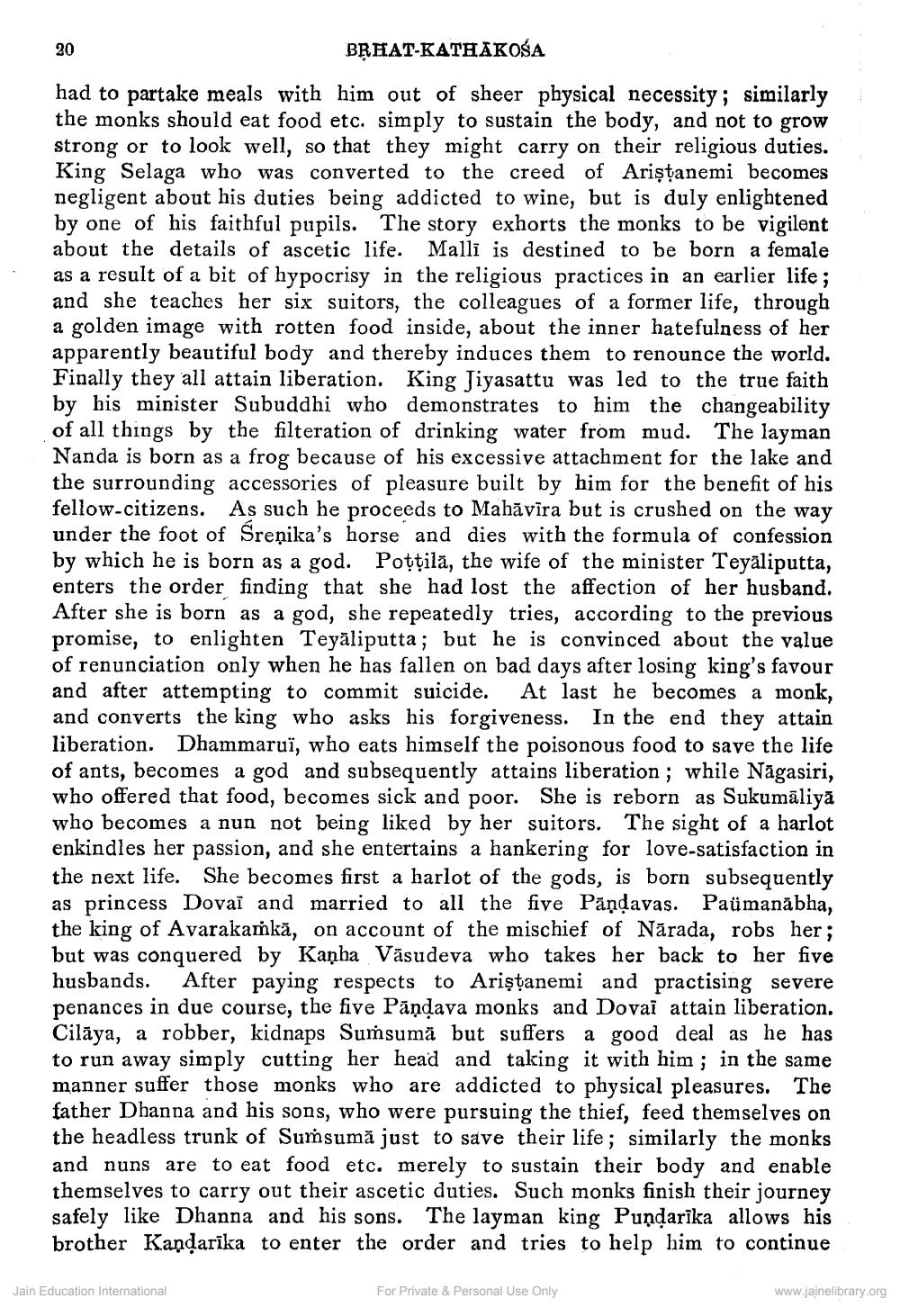________________
20
BRĦAT-KATHĀKOŠA had to partake meals with him out of sheer physical necessity; similarly the monks should eat food etc. simply to sustain the body, and not to grow strong or to look well, so that they might carry on their religious duties. King Selaga who was converted to the creed of Ariştanemi becomes negligent about his duties being addicted to wine, but is duly enlightened by one of his faithful pupils. The story exhorts the monks to be vigilent about the details of ascetic life. Malli is destined to be born a female as a result of a bit of hypocrisy in the religious practices in an earlier life; and she teaches her six suitors, the colleagues of a former life, through a golden image with rotten food inside, about the inner hatefulness of her apparently beautiful body and thereby induces them to renounce the world. Finally they all attain liberation. King Tiyasattu was led to the true faith by his minister Subuddhi who demonstrates to him the changeability of all things by the filteration of drinking water from mud. The layman Nanda is born as a frog because of his excessive attachment for the lake and the surrounding accessories of pleasure built by him for the benefit of his fellow-citizens. As such he proceeds to Mahāvīra but is crush under the foot of Sreņika's horse and dies with the formula of confession by which he is born as a god. Pottilā, the wife of the minister Teyaliputta, enters the order finding that she had lost the affection of her husband. After she is born as a god, she repeatedly tries, according to the previous promise, to enlighten Teyāliputta; but he is convinced about the value of renunciation only when he has fallen on bad days after losing king's favour and after attempting to commit suicide. At last he becomes a monk, and converts the king who asks his forgiveness. In the end they attain liberation. Dhammarus, who eats himself the poisonous food to save the life of ants, becomes a god and subsequently attains liberation; while Nāgasiri, who offered that food, becomes sick and poor. She is reborn as Sukumāliyā who becomes a nun not being liked by her suitors. The sight of a harlot enkindles her passion, and she entertains a hankering for love-satisfaction in the next life. She becomes first a harlot of the gods, is born subsequently as princess Dovai and married to all the five Pāndavas. Paümanābha, the king of Avarakamkā, on account of the mischief of Nārada, robs her; but was conquered by Kanha Vāsudeva who takes her back to her five husbands. After paying respects to Ariştanemi and practising severe penances in due course, the five Pāņdava monks and Dovai attain liberation. Cilāya, a robber, kidnaps Sumsumă but suffers a good deal as he has to run away simply cutting her head and taking it with him ; in the same manner suffer those monks who are addicted to physical pleasures. The father Dhanna and his sons, who were pursuing the thief, feed themselves on the headless trunk of Sumsumă just to save their life; similarly the monks and nuns are to eat food etc. merely to sustain their body and enable themselves to carry out their ascetic duties. Such monks finish their journey safely like Dhanna and his sons. The layman king Pundarika allows his brother Kandarīka to enter the order and tries to help him to continue
Jain Education International
For Private & Personal Use Only
www.jainelibrary.org




